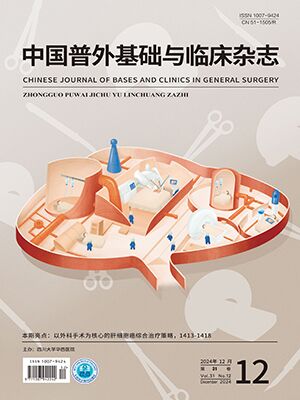| 1. |
Chang GJ, Rodriguez-Bigas MA, Skibber JM, et al. Lymph node evaluation and survival after curative resection of colon cancer: systematic review. J Natl Cancer Inst, 2007, 99(6): 433-441.
|
| 2. |
Lindboe CF. Lymph node harvest in colorectal adenocarcinoma specimens: the impact of improved fixation and examination procedures. APMIS, 2011, 119(6): 347-355.
|
| 3. |
Vather R, Sammour T, Kahokehr A, et al. Lymph node evaluation and long-term survival in stage Ⅱ and stage Ⅲ colon cancer: a national study. Ann Surg Oncol, 2009, 16(3): 585-593.
|
| 4. |
Horne J, Bateman AC, Carr NJ, et al. Lymph node revealing solutions in colorectal cancer: should they be used routinely?. J Clin Pathol, 2014, 67(5): 383-388.
|
| 5. |
Ogawa S, Itabashi M, Bamba Y, et al. Stage Ⅱ colon cancer staging using the number of retrieved lymph nodes may be superior to current TNM staging for prognosis stratification: the Japanese study group for postoperative follow-up of colorectal cancer. Int J Colorectal Dis, 2021, 36(10): 2205-2214.
|
| 6. |
Xiao J, Zhang H, Jiang D, et al. Lymph node stain after radical resection of rectal cancer mainly increased the harvest of mini lymph node: a randomized controlled trial. Int J Colorectal Dis, 2023, 38(1): 48.
|
| 7. |
Parsons HM, Tuttle TM, Kuntz KM, et al. Association between lymph node evaluation for colon cancer and node positivity over the past 20 years. JAMA, 2011, 306(10): 1089-1097.
|
| 8. |
Jia G, Lei P, Zhang Y, et al. New staging systems for left-sided colon cancer based on the number of retrieved and metastatic lymph nodes provide a more accurate prognosis. Pathol Oncol Res, 2023, 29: 1610874.
|
| 9. |
Liu J, Huang P, Zheng Z, et al. Modified methylene blue injection improves lymph node harvest in rectal cancer. ANZ J Surg, 2017, 87(4): 247-251.
|
| 10. |
Kanemitsu Y, Komori K, Ishiguro S, et al. The relationship of lymph node evaluation and colorectal cancer survival after curative resection: a multi-institutional study. Ann Surg Oncol, 2012, 19(7): 2169-2177.
|
| 11. |
Märkl B, Rößle J, Arnholdt HM, et al. The clinical significance of lymph node size in colon cancer. Mod Pathol, 2012, 25(10): 1413-1422.
|
| 12. |
Schrembs P, Martin B, Anthuber M, et al. The prognostic significance of lymph node size in node-positive colon cancer. PLoS One, 2018, 13(8): e0201072.
|
| 13. |
Tong S, Li M, Bao Y, et al. Size and number of lymph nodes were risk factors of recurrence in stage Ⅱ colorectal cancer. BMC Cancer, 2023, 23(1): 518.
|
| 14. |
Nawras M, Chawla K, DeRiso A, et al. The effect of preoperative endoscopic tattooing on lymph node retrieval in colorectal cancer: a systematic review and meta-analysis. Int J Colorectal Dis, 2023, 38(1): 166.
|
| 15. |
Emile SH, Horesh N, Garoufalia Z, et al. Predictors and survival outcomes of having less than 12 harvested lymph nodes in proctectomy for rectal cancer. Int J Colorectal Dis, 2023, 38(1): 225.
|
| 16. |
Li Destri G, Barchitta M, Pesce A, et al. Predictive value of the number of harvested lymph nodes and cut-off for lymph node ratio in the prognosis of stage Ⅱ and Ⅲ colorectal cancer patients. J Invest Surg, 2019, 32(1): 1-7.
|
| 17. |
Feo CV, Portinari M, Zuolo M, et al. Preoperative endoscopic tattooing to mark the tumour site does not improve lymph node retrieval in colorectal cancer: a retrospective cohort study. J Negat Results Biomed, 2015, 14: 9.
|
| 18. |
Chen YT, Wang JY, Wang JW, et al. Preoperative endoscopic tattooing technique improved lymph node retrieval in rectal cancer patients receiving neoadjuvant concurrent chemoradiotherapy. J Clin Pathol, 2020, 73(5): 267-272.
|
| 19. |
Ortrun R, Johannes B, Lars H, et al. Tumor size, tumor location, and antitumor inflammatory response are associated with lymph node size in colorectal cancer patients. Mod Pathol, 2017, 30(6): 897-904.
|
| 20. |
Sinan O, Selcuk G, Orhan U, et al. Clinical significance of the histopathological metastatic largest lymph node size in colorectal cancer patients. Front Oncol, 2023, 13: 1120753.
|
| 21. |
Joonsung C, Soon NO, Dong-Myung Y, et al. Computed tomography and magnetic resonance imaging evaluation of lymph node metastasis in early colorectal cancer. World J Gastroenterol, 2015, 21(2): 556-562.
|




